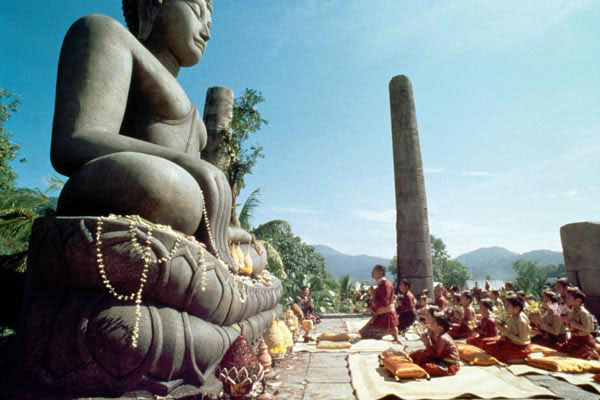

Let's make it clear: this is a review of Anna and the King, the 1999 Fox Entertainment film, directed by Andy Tennant and starring Jodie Foster as Anna Leonowens and Chow Yun Fat as King Mongkut of Siam, adapted from the diaries of Leonowens by Steve Meerson and Peter Krikes. With a stage musical, a musical film, an animated feature, and an earlier non-musical film adaption of the diaries of Anna Leonowens, this film is the second, and most recent non-musical version of what is otherwise known as Anna and the King of Siam and The King and I.
This version has not made the authorities in Thailand any happier than the earlier versions, either, because of what the Thai authorities view as the "disrepect" shown to "the beloved Monarchy" in the film, and distribution of the film is illegal in Thailand, carrying a potential sentence of life imprisonment. (In fact however, to this reviewer's knowledge, as of this writing, the only cases of arrests having been made by Thai authorities for distributing the film have been for copyright violations for distributing pirated tapes and disks of the movie, which are illegal to make, possess or distribute in most countries, including the USA.)
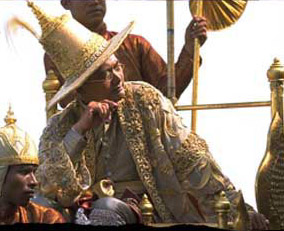
This reviewer is an outspoken opponent of censorship, and I do not endorse the banning of movies or books or television shows or plays (see my review of Cradle Will Rock for more on that subject!) because of their content, but I do agree with the Thai government that an inordinate amount of disrepect is shown to Thailand's national hero, King Mongkut, in the film. Accordingly, as a matter of simple courtesy, I have selected photographs from the film which do not show Chow Yun Fat portraying King Mongkut in a manner which would seem obviously disrepectful, and I have (after advising Fox) deliberately cropped one picture because its perspective makes it seem disrepectful to King Mongkut.
The story is so well-known that it can be summed up in a few sentences: Mrs. Anna Leonowens (her chosen name) is hired by the progressive King Mongkut of Siam to tutor the royal family, and the two of them clash repeatedly over social customs and etiquette until King Mongkut grudgingly comes to admire (and, it is strongly suggested, love) Anna. In this version of the film, a sub-plot about Burmese dacoits (bandits) raiding Siam, possibly with British help, puts a very different perspective on the story as it is commonly known, and King Mongkut is shown to be far more personally courageous than he has been portrayed in earlier versions. Another difference in this version is that the tragic outcome of Tuptim's love of Balat is laid at Mrs. Leonowen's feet, because her stubborn interference despite all protocol prevents King Mongkut from exercising mercy while Siam teeters on the brink of war with an English-protected Burma.
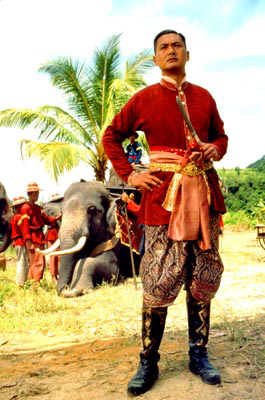
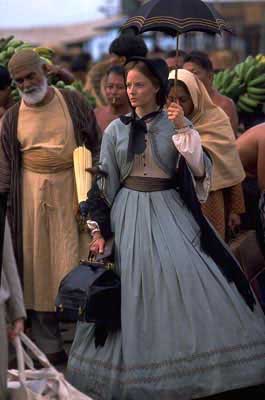
Mrs. Leonowens is portrayed in an excellent performance by former Oscar®-winner Jodie Foster, whose characterization "pulls no punches" as she shows just how tough the women of the British Raj could be in their determination to bring "civilization" to the farthest corners of the world. In Siam, however, she is not dealing with a subjugated country onto which she can force her ways and beliefs: she is a guest in an independent country whose ruler wants to modernize his country, banish corruption, and make his nation strong enough to stand up against agressive French and English colonialism.
Indeed, despite the disrepect which Anna Leonowens is shown displaying towards King Mongkut, this version of the story portrays King Mongkut as a far more powerful and wiser ruler than have earlier versions. Caught between British-dominated Burma and French encroachments on Siamese-influenced Cambodia (at one point, King Mongkut indignantly exclaims that Viet Nam, formerly an independent empire, is suddenly being called "French Indo-China"), Mongkut and his son Prince (later King) Chulalongkorn, maintained Siam's independence through a turbulent century. (Ten years after King Chulalongkorn's death, Siam was strong enough to join the Allies in the Great War, and it was thanks to the work of Kings Mongkut and Chulalongkorn that Siam retained its independence until its invasion by the Japanese Imperialists in 1942; indeed, except for that one period, Siam/Thailand is with the sole exception of Japan, the only country in Asia to have maintained its independence continuously from 1238 C.E. to the present day.) Another distinguishing mark of this version of the film is the obvious care which it gives to the rich Buddhist religious life of the Thai people, not denigrating it condescendingly as at least one other version has done.

So, wherein lies the disrepect? The most obvious source is Mrs. Leonowens's refusal to allow herself or her son Louis to be forced to genuflect before the King, touching their foreheads to the ground as a mark of respect and obedience. This refusal, in itself, was to be expected from any self-respecting Briton in the 19th Century, and helped to cause a war when Lord McCartney, Queen Victoria's ambassador to China, refused to allow even servants in his entourage to kowtow before the Emperor of China. However, in The King and I, Mrs. Leonowens is not even shown giving the King the sort of deep curtsy which would be expected of her in the presence of even younger members of Queen Victoria's family, nor is her son Louis shown giving the sort of deep bow which a well-mannered English boy might be expected to give to any adult of his own class, let alone a King! The behavior of Andy Tennant's Mrs. Leonowens would be considered insufferably rude even among ordinary middle-class Americans and Britons of her time; it is no surprise that the Thai authorities are upset by this misconduct in the film -- had Mrs. Leonowens behaved that way in Buckingham Palace she and her son would have been swiftly tossed out the back door!
Another, far subtler form of disrepect concerns the way the Thais themselves are shown saluting King Mongkut. Ordinarily, a monarch in Southeast Asia would be saluted by the placing of the palms together in front of the forehead, but in Anna and the King,which was filmed in Malaysia, the extras (hudreds of them!) place their hands lower down when Chow Yun Fat appears as King Mongkut, suggesting that he is a commoner, not a monarch. A comparable example in the USA would be a soldier showing his middle finger to the President instead of touching the brim of his cap, suggesting that the President is "just one of the guys" and not the Commander-in-Chief of the Armed Forces!
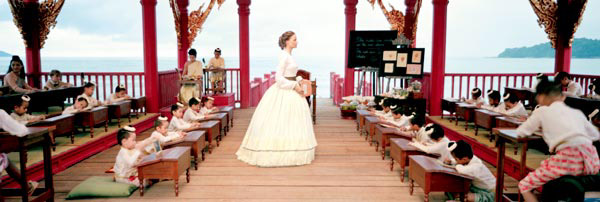
Those criticisms aside, and allowing for the taking of historical liberties (which Mrs. Leonowens did freely in her own life story), Anna and the King is the most gorgeous, sumptuous, and downright beautiful film of 1999. Shot in wide-screen 70mm, it is certainly worth the effort to travel to see this in a theater which can show 70mm films, as a comparison of the huge panorama presented in the above picture with the narrower photos above should clearly reveal. In order to see this film in all of its glory and truly appreciate the work done by Director Tennant; Cinematographer Caleb Deschanel; Editor Roger Bondelli; Production Designer Luciana Arrighi, Art Directors Lek Chaiyan Chunsuttiwat, Paul Ghirardani, and John Ralph; Set Decorator Ian Whittaker; Makeup Artist Marilyn MacDonald; and especially Costume Designer Jenny Bevan (an almost certain Oscar® nominee in this reviewer's opinion -- and this reviewer guessed both of winner Sandy Powell's nominations last year!), try to see this movie on the largest screen which you can find in your area -- it is well worth the effort.
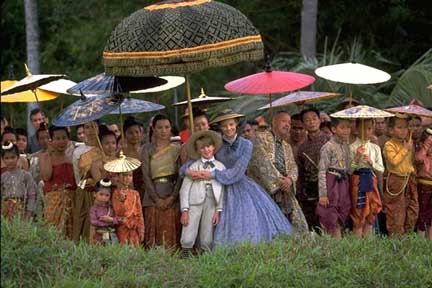
With the rise in theater ticket prices and the growing international audience of our page, our old NW2: Not Worth $2 to W8: Worth $8 rating scale has become less useful than previously, so, in line with the scale used by the Internet Movie Database (IMDb) we have adopted a scale of 1 star to 10 stars, with "1 Star" being a VERY bad movie, and "10 Stars" being a movie classic. Our On-Line Reviewer, however, has gone where IMDb has never gone before: he has added a score of Zero for those movies which are so bad that they are not even good "camp" -- movies so bad that not even "Mystery Science Theater 3000" could could make them worth watching.
On this scale, anything rated "7 Stars" or above is worth the cost of a theater ticket, "8 Stars" is worth standing in line to buy a ticket, "9 Stars" is worth standing in line in a driving rain rainstorm or killer heatwave to buy a ticket, and "10 Stars" is a movie worth driving hundreds of miles to go see -- at least in Dr. Shea's own opinion. Accordingly,
